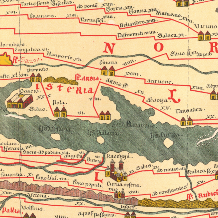Architecture of the Medieval Mediterranean, 1100-1300
Overview
Architecture was a Mediterranean affair in the Middle Ages. Columns, stones, building materials, labour and human resources were shipped from coast to coast. Without the sea much of the architectural landscape of the Middle Ages would not have existed. This module tries to look at the sea less as a surface, or as a mere connector, than as an architectural force. In doing so this module studies the architecture of seafaring, the engineering of ships, the making of the Mediterranean networks of harbours and ports, as well as the crucial role of island cities. Further, it aims at viewing the architecture as a trans-cultural phenomenon that engaged all the cultures overlooking the Mediterranean basin, from Fustat (precursor of Cairo) and Constantinople to Pisa and Marseille. In so doing, it articulates the issue of exchange in the medieval period as well as today's paradox of thinking of medieval communities as simultaneously in contact and in military opposition. For this reason, part of this course will also be dedicated the architecture of the crusades and medieval warfare.
Aims
By the end of the module, students should have acquired:
- A focused knowledge of a series of important Mediterranean Medieval buildings
- An understanding of major forces that shaped architecture in the Middle Ages
- A critical attitude when dealing with a text and historical evidence
- An improved capacity for reading a building
Preliminary reading
- Abulafia, Mediterranean Encounters
- Braudel, The Mediterranean and the Mediterranean World
- Goitein, A Mediterranean Society
- Husain and Fleming eds, A Faithful Sea
- Hoffman, Late Antique and Medieval Art of the Mediterranean World
- Behrens-Abouseif, Islamic Architecture in Cairo
- Ousterhout, Master Builders of Byznatium
- White, Art and Architecture in Italy, 1250-1400

Module information
- Module title
Architecture of the Medieval Mediterranean, 1100-1300- Module number
HOA00072M- Convenor
Emanuele Lugli
For postgraduates
